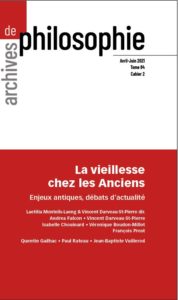 Volume 84, Issue 2, April-June 2021
Volume 84, Issue 2, April-June 2021
 Vincent Darveau-St-Pierre & Laetitia Monteils-Laeng,Old age according to the ancients: Ancient issues, topical debates. Foreword
Vincent Darveau-St-Pierre & Laetitia Monteils-Laeng,Old age according to the ancients: Ancient issues, topical debates. Foreword
Andrea Falcon, Aristotle on longevity
My aim is to examine the extent to which Aristotle achieves his stated goal. I concentrate on the explanatory strategy adopted in the De longitudine et brevitate vitae (On Length and Shortness of Life), where Aristotle offers an account of longevity that is not programmatically restricted to animals. I will discuss the prospects, as well as the limits, of this joint study of animals and plants. How much is Aristotle really able to say on the topic of longevity that applies to both animals and plants? Answering this question is at the heart of my essay.
Vincent Darveau-St-Pierre, The Hippocratic remedy for ageism
By describing old age as one of the possible modalities of balance of the primary qualities that ensure health to the individual, the authors of the Hippocratic Corpus avoid systematically associating aging with degeneration. This singular aspect of the corpus has an ethical interest for us: it protects against medical ageism. This article addresses the issue of the physiological differences that characterize each of the ages of life by insisting on the fact that this conception favors an egalitarian treatment of patients with respect to age.
Isabelle Chouinard, Losing atoms: Democritus on old age
In the ethical fragments, Democritus presents old age as an age in which moderation manifests itself more easily than in youth (68B294 DK). The fact that he also describes old age as “a general mutilation (πήρωσις ὁλόκληρος)” (68B296 DK) suggests that his atomic theory may have been used to account for the phenomenon. Understood as a loss of atoms in all parts of the body, the πήρωσις in turn causes leaks of psychic atoms which can have an effect on the temperament of old people. If this hypothesis is correct, it adds to the number of possible links between the atomic theory and Democritus’s moral thinking.
Véronique Boudon-Millot, Agelessness and green old age: The contribution of philosophers and physicians
Based on the only four occurrences of the word agerasia (agelessness) in all of Greek literature, but also on the links between agerasia and athanasia (immortality) on the one hand, and between agerasia and eugeria (green old age) on the other, this paper tries to specify how the Greek physician Galen and the Greek philosophers Aristotle and Philo of Alexandria imagined old age and, more precisely, how they defined beautiful old age.
François Prost, Old age in Cicero’s Cato Maior de senectute
This article focuses on old age in Cicero’s Cato Maior de Senectute. It first takes into account the context and circumstances of Cicero’s reflection on the issue, and then reviews the sources and models of the work. The content of the work is further analyzed as a lesson of wisdom, which relies on the resources available to older men in order to secure happiness. Cato’s speech thus takes the form of an apology of old age under four main headings: activity, physical condition, pleasure, and the coming of death, in tune with modern approaches of the ethics of care.
Laetitia Monteils-Laeng, What is life experience worth? Platonic lucidity, Aristotelian bitterness
A passage from Plato’s Sophist (234a-e) seems to suggest that our opinions evolve and our illusions dissipate only with age and the trials we undergo. By contrast, in the Rhetoric (II, 13), Aristotle seems to devalue accumulated life experience. What are the effects of the passage of time on what we think and feel? This article explores this question by examining the thoughts of Plato and Aristotle.
* * *
Quentin Gailhac, Reproducing the origin: On two classical readings of Plutarch’s De musica
The two receptions of Plutarch’s De musica by Pierre-Jean Burette and Jean-Jacques Rousseau examine in two dissimilar ways the relationship between original musical discoveries and their sensitive appropriation through usage. According to Burette, usage, thought of as a habit, makes it possible to historicize the origin without radicalizing the singularity of the circumstances. By refusing to confer such flexibility to usage, in the name of an irreversible degeneration of musical history, Rousseau historicized the origin to the point of non-reproducibility of circumstances.
Paul rateau, Demonstrating God: Leibniz and the continuous creation argument
Leibniz endorses the thesis of continuous creation. The aim of this article is to show why, for him, the attempts of Descartes and Weigel to use it as a proof of the existence of God have failed and what, in his own metaphysics, prevents the development of a fully satisfactory demonstration of the latter on that basis. It is in fact uncertain whether Leibniz succeeded in perfectly reconciling the necessity of a permanent dependence of creatures on their creator—which requires his continual action—and the requirement of causal autonomy for finite substances.
Jean-Baptiste Vuillerod, Hegel, world history, and the conquest of the seas
This article aims to discuss how Hegel dealt with the seas in his work. It explains that the young Hegel stressed the dangerous aspects of the seas by discussing the biblical Flood, but in his mature thought, in the Lectures on the Philosophy of History, he considered the conquest of the seas as a fundamental impulse for world history and for progress toward freedom. This conquest did not mean that Hegel justified mastery and domination over nature. On the contrary, he thought that the relation to the seas was a model for a new and harmonious alliance between men and their environment.
